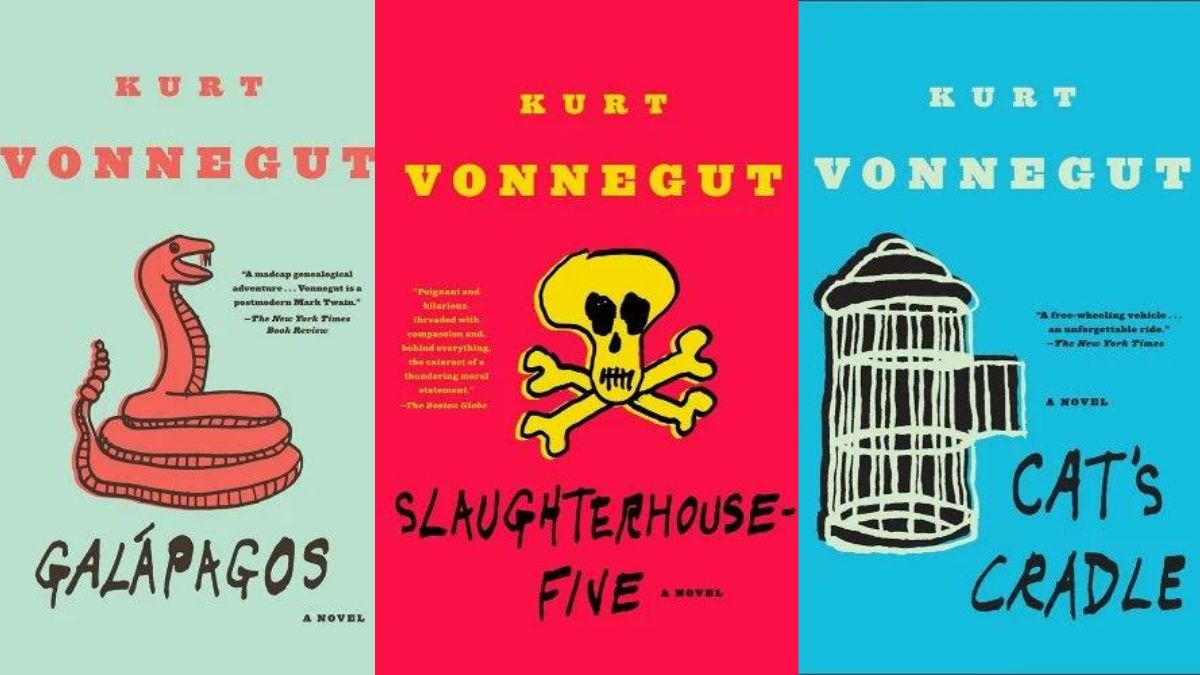‘So it goes’: Ranking the novels of one of America’s greatest dark humorists

Many readers don’t realize that Kurt Vonnegut, author of seemingly serious books like Cat’s Cradle and Slaughterhouse-Five, was actually really funny.
Vonnegut was a prisoner of war during World War II who survived the bombing of Dresden, Germany by hiding in the slaughterhouse where he’d been held hostage. His trauma permeated and influenced his work in innumerable ways, yet his use of satire and wit made his work more enjoyable for war-weary readers. Read on for a ranking of the 14 novels Vonnegut published in his lifetime.
14. Deadeye Dick (1982)
Deadeye Dick tells the story of Rudy Waltz, a 12-year-old boy in Midland, Ohio who shoots a gun from a window and accidentally kills a pregnant woman. He spends the rest of his life punishing himself by leading an asexual and lonely existence. This story is rather sad, but it has some classic Vonnegut elements. For instance, Rudy’s father is from Austria, and his childhood best friend was a young Adolf Hitler.
13. Slapstick (1976)
In Slapstick, which was dedicated to the late comedy team Laurel and Hardy, Vonnegut explores the themes of family and loneliness. The character Dr. Swain has a plan to create vast extended families using a system he invented that links people by randomly assigned numbers in their middle names. It’s an idea he got with his sister, Eliza, his “other half,” who is now in a mental health facility.
12. Player Piano (1952)
Player Piano was Vonnegut’s first novel, and it’s incredible how prescient it is when placed in the context of AI and other emerging technology. The author was ahead of his time when he penned this story about an engineer whose livelihood is eliminated because machines now run and do everything in society.
11. God Bless You, Mr. Rosewater (1965)
God Bless You, Mr. Rosewater is an important work for Vonnegut, and one that sets up the action for his sixth and next published book, Slaughterhouse-Five. Several characters, places, and events were previewed in this novel, including the character of journalist Kilgore Trout, Vonnegut’s alter ego.
The story is about a multi-millionaire who suddenly grows a conscience, moving his Rosewater Foundation to Indiana and vowing to bestow love and money on anyone who comes to ask for them. Often funny, it’s a biting commentary on American classism and social structures.
10. The Sirens of Titan (1959)
The Sirens of Titan is Vonnegut’s second book, and it’s in more of a sci-fi vein than many others. The story is about Martians invading the earth, and it deals heavily with themes like free will and unseen “others” meddling in our society behind the scenes.
9. Jailbird (1979)
Jailbird is one of Vonnegut’s most politically scathing novels, often referred to as his “Watergate novel.” It follows a little-known member of the Nixon scandal named Water F. Starbuck, who narrates the novel after being released from federal prison for his part in the crimes.
8. Timequake (1997)
Timequake has been called “semi-autobiographical,” and the author (correctly) stated in the introduction that it would be his last novel. The protagonist is, once again, Kilgore Trout, who experiences a “timequake” in which time reverts back to 1991 and replays until 2001.
7. Bluebeard (1987)
Many fans believe Bluebeard is one of Vonnegut’s funniest books. It’s a fictional autobiography of a faux Abstract Expressionist painter named Rabo Karabekian, a character we first met in the 1973 novel Breakfast of Champions. The title refers to the French fairy tale Bluebeard, about an old man who murders his wives.
6. Breakfast of Champions (1973)
Breakfast of Champions brings us back to Midland, Ohio, to meet Dwayne Hoover and reintroduce us to Kilgore Trout. The book is all about a life-changing meeting between the two men, and Vonnegut deftly interweaves their stories while exploring themes about suicide, race relations, and yet again, what it means to be truly free in our society.
5. Hocus Pocus (1990)
Hocus Pocus is an odd book, but also deeply interesting and surprisingly funny. It stars Eugene Debs Hartke, a character whose names were borrowed from real-life Indiana politicos Eugene V. Debs and Vance Hartke. This Hartke is a Vietnam veteran who kills the exact number of women he’s had sex with.
4. Galapagos (1985)
Galapagos is about a group of people on a pleasure cruise in 1986 who become stranded on the Galapagos Islands after a massive global financial crisis occurs. The group must start a new society, giving us all a chance to examine modern society to see what we should keep, and what needs to go. The book evokes Charles Darwin, who spent time in the Galapagos while developing his theories on evolution and natural selection.
3. Mother Night (1961)
Mother Night is a powerful novel told from the perspective of a real-life war criminal. Written from the perspective of Howard W. Campbell, Jr., a playwright and Nazi propagandist awaiting trial in an Israeli prison.
2. Cat’s Cradle (1963)
Cat’s Cradle is considered one of Vonnegut’s greatest works, and a postmodern satire for the ages. It’s a wild tale involving a narrator who is involved in a religious cult called Bokononism, the apocalypse, and the ultimate fate of the planet. Here, the author skewers technology, science, and of course, religion.
1. Slaughterhouse-Five (1969)
We’re stating the obvious here, but Slaughterhouse-Five is unquestionably Vonnegut’s masterwork. The semi-autographical novel incorporates many of his WWII experiences into the character of Billy Pilgrim, a veteran who time travels while coping with severe PTSD. Like the author, Pilgrim is captured by the Germans and held at a slaughterhouse in Dresden, and later survives the city bombing.
With its superb use of repetition (“So it goes …”), deeply cynical humor, and devastating portrayal of the lasting trauma caused by war, Slaughterhouse-Five is considered to be one of the greatest anti-war novels of all time.
Have a tip we should know? tips@themarysue.com